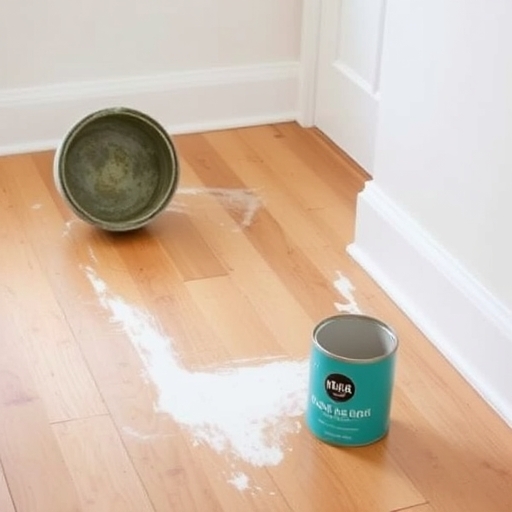How to Get Paint Off of Hardwood Floors
Removing paint from hardwood floors can be a daunting task, especially if you want to preserve the beauty and integrity of the wood. Whether you’ve spilled paint during a DIY project or are trying to restore an old floor, this guide will provide you with step-by-step instructions, tips, and tricks to effectively get paint off of hardwood floors without causing damage.
Understanding the Types of Paint
Before diving into the removal process, it’s essential to understand the type of paint you’re dealing with. The method you choose may vary depending on whether the paint is water-based or oil-based.
Water-Based Paint
- Characteristics: Quick-drying, easy to clean with soap and water.
- Removal: Generally easier to remove than oil-based paints.
- Characteristics: Longer drying time, more durable finish, requires solvents for cleanup.
- Removal: More challenging to remove and may require stronger chemicals.
- Plastic scraper or putty knife
- Soft cloths or rags
- Bucket
- Sponge
- Paintbrush (for applying solvents)
- Sandpaper (fine-grit)
- For Water-Based Paint:
- Warm soapy water
- Vinegar solution (1 part vinegar to 1 part water)
- For Oil-Based Paint:
- Paint thinner or mineral spirits
- Acetone (nail polish remover)
- Commercial paint remover
- Gloves
- Goggles
- Mask (to avoid inhaling fumes)
- After removing the paint, clean the area with a solution of vinegar and water to neutralize any remaining chemicals.
- Dry the area thoroughly with a clean cloth.
- When to Use: For thick layers of paint or when other methods fail.
- How to Do It:
- When to Use: For stubborn paint that refuses to budge.
- How to Do It:
- When to Use: As a last resort when other methods have failed.
- How to Do It:
- Use Drop Cloths: Always cover your floors with drop cloths when painting.
- Tape Off Areas: Use painter’s tape to protect baseboards and floor edges.
- Choose the Right Paint: Opt for paints that are less prone to dripping or splattering.
Oil-Based Paint
Tools and Materials You’ll Need
Before starting the paint removal process, gather the following tools and materials:
Basic Tools
Cleaning Solutions
Safety Equipment
Step-by-Step Guide to Removing Paint
Step 1: Assess the Situation
Before you start, assess the amount and type of paint on the hardwood floor. This will determine your approach.
Step 2: Test a Small Area
Always test any cleaning solution on a small, inconspicuous area of the floor to ensure it won’t damage the finish.
Step 3: Remove Excess Paint
Using a plastic scraper or putty knife, gently scrape off any excess paint. Be careful not to gouge the wood.
Step 4: Choose Your Cleaning Method
For Water-Based Paint
1. Apply Warm Soapy Water: Use a sponge or cloth to apply warm soapy water directly to the paint. Let it sit for a few minutes.
2. Scrape Again: Gently scrape the softened paint with a plastic scraper.
3. Rinse: Wipe the area with a clean, damp cloth to remove any soap residue.
For Oil-Based Paint
1. Apply Paint Thinner or Mineral Spirits: Soak a cloth with paint thinner or mineral spirits and place it over the paint stain. Let it sit for 10-15 minutes.
2. Scrape the Paint: Use a plastic scraper to gently lift the paint off the floor.
3. Clean the Area: Wipe the area with a clean cloth to remove any residue.
Step 5: Repeat if Necessary
If paint remains, repeat the process, applying more solution as needed until the paint is completely removed.
Step 6: Final Clean-Up
Step 7: Repairing the Finish
If the hardwood floor’s finish is damaged, consider applying a wood polish or a fresh coat of polyurethane to restore its shine.
Alternative Methods for Stubborn Paint
If the standard methods don’t work, you may want to try more aggressive approaches:
Sanding
1. Use fine-grit sandpaper (220 grit).
2. Sand the affected area lightly until the paint is removed.
3. Wipe clean and apply a protective finish.
Heat Gun
1. Use a heat gun on a low setting to soften the paint.
2. Scrape away the paint while it’s hot.
3. Be cautious to avoid burning the wood.
Commercial Paint Strippers
1. Follow the manufacturer’s instructions carefully.
2. Ensure adequate ventilation and wear protective gear.
Comparison of Paint Removal Methods
| Method | Effectiveness | Ease of Use | Safety Level | Cost |
|---|---|---|---|---|
| Warm Soapy Water | Low | Easy | High | Low |
| Vinegar Solution | Low | Easy | High | Low |
| Paint Thinner/Mineral Spirits | High | Moderate | Moderate | Moderate |
| Acetone | High | Moderate | Low | Moderate |
| Sanding | High | Hard | Moderate | Low |
| Heat Gun | High | Moderate | Low | Moderate |
| Commercial Paint Stripper | Very High | Moderate | Low | High |
Prevention Tips
To avoid future paint spills on your hardwood floors, consider the following tips:
Frequently Asked Questions
How do I know if the paint is water-based or oil-based?
You can test a small amount of paint with rubbing alcohol. If it dissolves, it’s water-based; if it doesn’t, it’s likely oil-based.
Can I use a steam cleaner to remove paint from hardwood floors?
Steam cleaners are not recommended for hardwood floors as they can warp the wood and damage the finish.
What if the paint has dried for a long time?
If the paint has dried for a long time, you may need to use a combination of methods, such as heat or commercial paint strippers, to remove it effectively.
Is it safe to use chemicals near pets?
Always ensure that the area is well-ventilated and keep pets away from the area until all residues have been cleaned up and the area is safe.
How can I restore the finish after paint removal?
After paint removal, you can restore the finish by applying a wood polish or a new coat of polyurethane, following the manufacturer’s instructions.
Conclusion
Removing paint from hardwood floors doesn’t have to be a nightmare. By understanding the type of paint, using the right tools and techniques, and taking preventive measures, you can effectively restore your floors to their original beauty. Whether you opt for simple methods like soapy water or more aggressive techniques like sanding, patience and care will yield the best results. Always remember to test any solution in a small area first and take the necessary safety precautions. Happy cleaning!

